七年级英语下册-Unit-11-How-was-your-school-trip(第2课时)教案-(新版)人教新目标版
七年级英语下册unit11how_was_your_school_trip_period_1课件
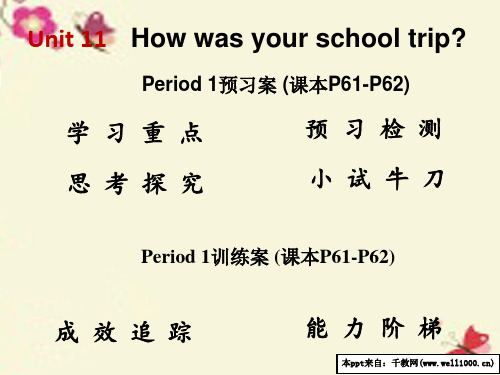
预习检测
一、请根据中文意思写出下列单词。(这些都是黑
体单词,要好好记住哦。)
1. __m_i_lk_______ v. 挤奶
2. ___h_o_r_s_e___________ n. 马
3. ___c_o_w_____________ n. 奶牛
9. _fl_o_w_e_r_______________n. 花
10. p_i_c_k_____ v. 采;摘
本ppt来自:千教网()
预习检测
11. _fa_r_m______ v. 种田 n. 农场 12. _fa_r_m__e_r ___ n. 农民,农场主
二、请认真阅读课本,找出以下短语。 13. 给奶牛挤奶 __m_i_lk__a_c_o_w_____________ 14. 骑马___ri_d_e_a__h_o_r_s_e___________ 15. 喂鸡 __fe_e_d__c_h_ic_k_e_n__s_______________ 16. 许多___q__u_it_e_a__lo_t____________ 17. 在乡下;在农村_i_n_t_h_e_c_o__u_n_tr_y_s_i_d_e____ 18. 带某人参观 __s_h_o__w_s_b__. _a_ro_u_n__d
本ppt来自:千教网()
小试牛刀
5) I have __q__u_it_e___ _____a______ ___g_o_o_d____ horse. (我有一匹相当不错的马。) = I have _____a_____ _____v_e_r_y___ ___g_o_o_d____ horse.
本ppt来自:千教网()
思考探究
★ anything &something的意思和用法: anything是复合不定代词,一般用于_疑__问_______ 句和_否__定_______句中。something常用于 _肯__定_______句中,或在表示委婉的邀请、请求、 建议或希望得到肯定回答的_疑__问_______中。复合 不定代词修饰形容词时,形容词要放在不定代词的 _后______(前/后)面;当它们作为主语时,谓语动 词要用_单_________(单/复)数。 ★ feed的意思和用法 feed作为vt.,意为“喂养;饲养”,其过去式为 __f_e_d______。常见的搭配短语有:“用….. 喂……”______f_e_e_d_…_w__it_h_…_______本_ppt_来自_:_千_教网;()
新目标版英语七年级下册Unit11Howwasyourschooltrip?(SectionA)含答案
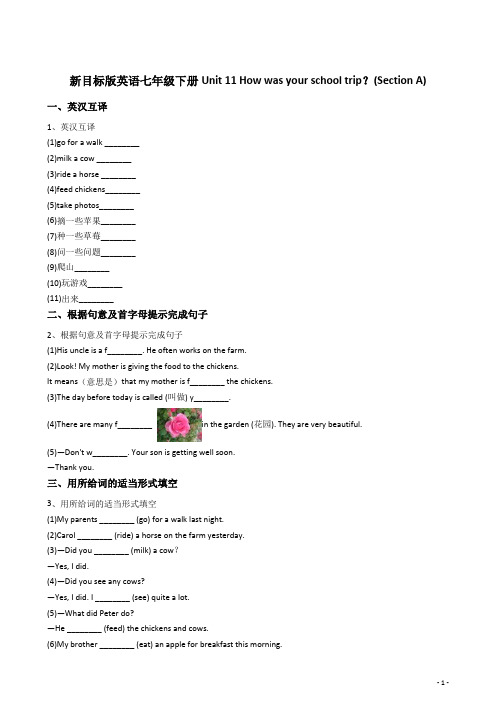
新目标版英语七年级下册Unit 11 How was your school trip?(Section A)一、英汉互译1、英汉互译(1)go for a walk ________(2)milk a cow ________(3)ride a horse ________(4)feed chickens________(5)take photos________(6)摘一些苹果________(7)种一些草莓________(8)问一些问题________(9)爬山________(10)玩游戏________(11)出来________二、根据句意及首字母提示完成句子2、根据句意及首字母提示完成句子(1)His uncle is a f________. He often works on the farm.(2)Look! My mother is giving the food to the chickens.It means(意思是)that my mother is f________ the chickens.(3)The day before today is called (叫做) y________.(4)There are many f________ in the garden (花园). They are very beautiful.(5)—Don't w________. Your son is getting well soon.—Thank you.三、用所给词的适当形式填空3、用所给词的适当形式填空(1)My parents ________ (go) for a walk last night.(2)Carol ________ (ride) a horse on the farm yesterday.(3)—Did you ________ (milk) a cow?—Yes, I did.(4)—Did you see any cows?—Yes, I did. I ________ (see) quite a lot.(5)—What did Peter do?—He ________ (feed) the chickens and cows.(6)My brother ________ (eat) an apple for breakfast this morning.(7)John ________ (study) English last Friday.(8)There ________ (be) two books on the table five minutes ago (以前).(9)They ________ (play) basketball yesterday afternoon.(10)The man ________ (stop) his car and ________ (buy) some strawberries yesterday morning.四、单选题4、It ___________ sunny yesterday. It ___________ rainy today.A、is; isB、is, wasC、was, isD、was; was5、—Jack, is there ___________ in today's newspaper?—No, nothing.A、anything importantB、something importantC、important anythingD、important something6、Yesterday my father ___________ his friends ___________ Tian'anmen Square (天安门广场).A、shows; aboutB、shows, aroundC、showed; aboutD、showed; around7、Could you say it again? I can't understand ___________ you are talking about.A、howB、whenC、whatD、which8、—___________ he go to Central Park?—Yes, he did.A、DidB、DoC、DoesD、Is9、It ___________ last week that the haze(雾霾) in Beijing caused many problems.A、reportsB、reportedC、is reportedD、was reported10、—Did Jim and Sue go to the party?—No, they ___________.A、didB、didn'tC、wereD、weren't11、—Do you need a new dictionary, Susan?—No, Mum. My uncle ___________ me one yesterday.A、buyB、buysC、boughtD、is buying12、—Who is it?—Me. I ___________ this photo when I was four.A、tookB、takesC、takeD、am taking13、Last Sunday, Carol and his friends ___________ some apples and ___________ them home.A、pick; tookB、picked; tookC、picked; takeD、pick, take五、根据汉语提示完成句子14、根据汉语提示完成句子(1)Don't ________(担心). The ________(太阳)is coming out.(2)My classmate helped ________(农民)________(种植)rice and ________(采;摘)apples last Sunday.(3)There are ________ ________ ________ ________ ________(相当多的马)on the farm.(4)—Did you learn ________ ________(优秀的东西)in the ________(农村)?—Yes, I did.(5)She was very ill, but ________(幸运地)she is now out of danger.六、按要求改写句子15、按要求改写句子(1)My school trip was pretty great last weekend.(对画线部分提问)________ was ________ school trip last weekend?(2)The twins played computer games yesterday.(改为一般疑问句,并作否定回答)—________ the twins ________ computer games yesterday?—No, ________ ________.(3)I saw cows last week. (改为一般疑问句,并作肯定回答)—________ you ________ cows last week?—Yes, ________ ________.(4)There were some chickens on the farm.(改为一般疑问句,并作肯定回答)—________ ________ ________ chickens on the farm?—Yes, ________ ________.(5)My family went fishing last Sunday.(对画线部分提问)________ ________ ________ family ________ last Sunday?七、补全对话16、补全对话Jim: Hey, Sally! I didn't see you last Saturday. Where were you?Sally:(1)________Jim: Why?Sally:(2)________Jim: Like what?Sally: Well, I cleaned my room. And I did my homework.Jim:(3)________Sally: Yes. How about you? What did you do?Jim:(4)________Sally: Wow! You had fun.Jim:(5)________八、阅读理解17、阅读理解We went on a school trip to New York. We had a good time. There were twenty-four students and three teachers. It was a five-day trip, and we visited some attractions (景点).We stayed at a hotel and six people had one room. We often had our meals out of the hotel—there were a number of restaurants nearby. We went around the city, and we were really given quite a lot of freedom(自由). So long as (只要) we were back to our rooms by 10 p.m., we could go where we wanted to. I was surprised at how safe I felt walking around New York in small groups. My friends and I enjoyed ourselves on the trip. I would like to advise it to anyone. If you decide to go, you will have a great time!(1)What is the message mainly about?A、A picnicB、A school trip.C、Ice-skatingD、Shopping.(2)How many people went on the trip?A、SixB、TenC、Twenty-fourD、Twenty-seven.(3)According to the passage, which of the following is NOT true?A、Six students lived in one room in the hotel.B、Students had to get back to the hotel by 10 pm.C、Students spent five days on the trip.D、Students had their meals in the hotel.(4)What did the author think of the trip?A、He had a good time.B、He wanted more freedom on the trip.C、He didn't want to come back.D、He was surprised at how dangerous New York was.(5)What does the underlined word "advise" mean in Chinese?A、说B、推荐C、建议D、喜欢答案解析部分一、英汉互译1、【答案】(1)去散步(2)给奶牛挤奶(3)骑马(4)喂鸡(5)照相(6)pick some apples(7)grow some strawberries(8)ask some questions(9)climb the mountains(10)play games(11)come out【解析】【分析】考查短语的英汉互译,注意名词要用复数形式。
最新人教新目标英语七年级下册unit 11《how was your school trip》 period课件3
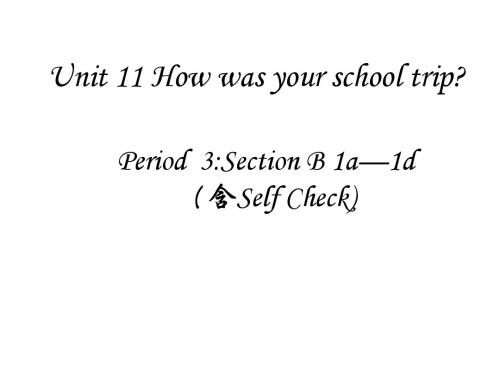
Who had a fantastic school trip?
Name
Tom
When
last weekend
Place
Beijing
What did…do?
Write more verbs and their past forms in each group.
climb—climbed
walk — walked visit — visited play —played
went — go climbed — climb saw — see drew — draw went — go
Ask the students to read the conversation after the tape then recite it after class.
T: What was your last school trip like? Let’s make a survey and then have a report.
have — had see — saw
Complete the conversations.
1. A: I went to the countryside this summer. was B: Really? How __________ the trip?
was A: It ___________ great!
arrive— arrived
study—studied
stop—stopped
shop —shopped plan — planned
dance — danced worry — worried live — lived use — used carry — carried
七年级英语下册 Unit 11 How was your school trip Section B(第3课时)教案 (新版)人教新目标版
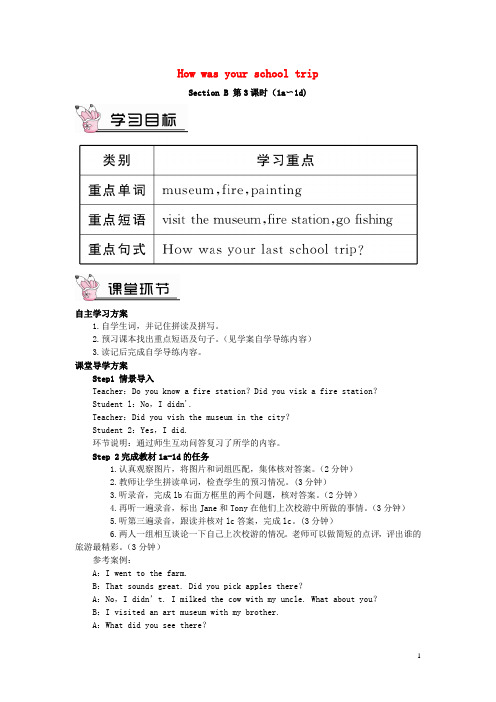
How was your school tripSection B 第3课时(1a〜1d)自主学习方案1.自学生词,并记住拼读及拼写。
2.预习课本找出重点短语及句子。
(见学案自学导练内容)3.读记后完成自学导练内容。
课堂导学方案Step1 情景导入Teacher:Do you know a fire station?Did you visk a fire station?Student l:No,I didn'.Teacher:Did you vish the museum in the city?Student 2:Yes,I did.环节说明:通过师生互动问答复习了所学的内容。
Step 2完成教材1a-1d的任务1.认真观察图片,将图片和词组匹配,集体核对答案。
(2分钟)2.教师让学生拼读单词,检查学生的预习情况。
(3分钟)3.听录音,完成lb右面方框里的两个问题,核对答案。
(2分钟)4.再听一遍录音,标出Jane和Tony在他们上次校游中所做的事情。
(3分钟)5.听第三遍录音,跟读并核对lc答案,完成lc。
(3分钟)6.两人一组相互谈论一下自己上次校游的情况。
老师可以做简短的点评,评出谁的旅游最精彩。
(3分钟)参考案例:A:I went to the farm.B:That sounds great. Did you pick apples there?A:No,I didn’t. I milked the cow with my uncle. What about you?B:I visited an art museum with my brother.A:What did you see there?B:I saw many interesting paintings.7.小结训练。
(3分钟)(1)A:What did you do on vacation?B:I went to Xi,an.A: Xi’an?What did you do there?B:I climbed a mountain.A:Great! Did you have fun?B:Yes. Very much. What about you?A:I visited Xinjiang.B:How did you go there?A:By train.(2)How was Jack's (Jack) school trip?环节说明:通过听说训练,学生更熟练地掌握语言交际用语,通过小结训练,语言目标得以强化。
2015新目标英语七年级下册Unit_11_How_was_your_school_trip__Section_A 1a-2d
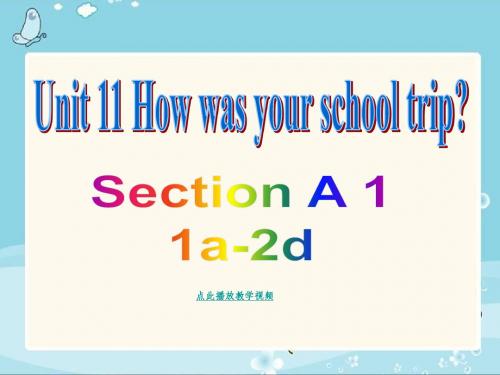
1a Match the phrases with the pictures. went for a walk e milked a cow b rode a horse a fed chickens c talked with a farmer f took some photos d
1b Listen and circle the three things Carol did on her school trip in 1a.
2b Listen again. Circle T for true or F for false. 1 The farmer showed Carol around the farm. T F 2 Carol learned a lot about farming. T F 3 The farmers grow strawberries from December to June. T F 4 The farmers don’t grow apples. T F 5 Carol picked some strawberries and took them home. T F
What did you do last month?
I went ____ to the countryside.
How ____ was the countryside?
It was beautiful. ____ you go to the zoo? id
No, I didn’t.
What ___ did they do 3 days ago? They __________ had a party with their friends. How was ___ their party? It was exciting.
人教新目标七年级英语下册课堂笔记Unit 11 How was your school trip

Unit 11 How was your schooltrip?2012版人教新目标七年级英语下册课堂笔记1. milk v. 挤奶Can you milk a cow?milkn.牛奶名词动词water(水)water(浇水)plant(植物)plant(种植)rain(雨)rain(下雨)2. cow n. 奶牛There are many cows on the farm.milk a cow给奶牛挤奶3. horse n. 马ride a horse骑马black horse 黑马Horses are very useful animals.tigerlionmonkeyelephant dog cat panda cow ducksnake chicken4. feed v. 喂养;饲养You can feed the cows with grass.feed on以……为食;靠……为生5. farmer n. 农民;农场主His grandfather is a farmer.farm农场6. quite adv. 相当;完全He can speak English quite well.近:very非常;很quite good相当好quite a lot相当多quite a few很多7. anything pron. (常用于否定句或疑问句),任何东西; 任何事物I can’t see anything in the dark.Is there anything in the box?any任何的thing事情8. grow v. 种植;生长;发育The farmers are growing potatoes.The vegetables grow well.grow up长大;生长9. farm n. 农场v. 务农;种田There are 60 cows on this farm.He is farming in America.on the farm在农场farm work农活farmer农民farming农事10. pick v. 采;摘Don’t pick flowers in the park.pick up拿起,捡起(某物);用车接(某人)pick off摘掉,采下11. excellent adj. 极好的;优秀的She is an excellent doctor.近:wonderful极好的反:bad坏的;不好的terrible糟糕的be excellent in…在……方面极好12. countryside n. 乡村;农村They live a happy life in the countryside.in the countryside在乡下;在农村country国家town城镇city城市13. yesterday adv. 昨天I saw him in the library yesterday.today今天tommow明天14. flower n. 花This is a beautiful flower.flower shop花店grass草tree树15. worry v. & n. 担心;担忧Don’t worry about me.My only worry is that I can’t pass the exam.近:care担忧worry about担心worryn.烦恼;v.(使)烦恼;困扰worriedadj.担心的;担忧的16. luckily adv. 幸运地;好运地Luckily I was there in time.luck运气lucky幸运的unlucky不幸的unluckily不幸地17. sun n. 太阳The sun rises in the east.sunny阳光充足的moon月亮star星星1. museum n. 博物馆She can’t go to the museum with us.art museum美术博物馆history museum历史博物馆2. fire n. 火;火灾Don’t play with fire,because it’s very dangerous.fire station消防站fire alarm火警make a fire生火on fire着火3. painting n.油画;绘画My father bought several old paintings.近:drawingn.素描paintv.涂4. exciting adj. 使人兴奋的;令人激动的It’s an exciting TV play.反:boring无聊的excited感到兴奋的;感到激动的5. lovely adj. 可爱的The panda is a lovely animal.近:cute6. expensive adj. 昂贵的This is an expensive car.近:dear昂贵的反:cheap便宜的7. cheap adj. 廉价的; 便宜的反:dear,expensiveThis delicious bread is very cheap.8. slow adj. 缓慢的;迟缓的My watch was slow, so I was late for school.反:fast快的quick迅速的slowly缓慢地9. fast adj. & adv. 快的(地)You shouldn’t drive your car so fast, it’s very dangerous.近:quick;quickly反:slow;slowlyfast food速食;快餐fastadj.&adv.紧的(地);牢固的(地)10. robot n. 机器人Roberts can help people work.Android安卓操作系统;人形机器人11. guide n.导游;向导Our guide is a beautiful girl.guide dog导盲犬12. gift n. 礼物;赠品We must buy some gifts for our children.近:presentgift shop礼品店birthday gift生日礼物13. everything pron. 所有事物;一切Is everything all right?every每一thing事情14. interested adj. 感兴趣的Are you interested in Beijing Opera?be interested in…对……感兴趣interesting有意思的;有趣的15. dark adj. 黑暗的;昏暗的The house was quite dark inside.反:brightdark room暗室16. hear v.听见;听到I called after you, but you did not hear.listenv.听hear of听说1. went for a walk 去散步go for+名词表示去某处参加活动go for a swim去游泳go for a drive 开车去兜风2. fed chickens 喂鸡3. Did you see any cows? 你看见奶牛了吗?4. Did you learn anything? 你学到了什么东西吗?5. The farmer showed Carol around the farm.那位农民带卡罗尔参观了农场。
七年级英语下册 Unit 11 How was your school trip(第6课时)教案 (新版)人教新目标版
目标学习一般过去时;学会谈论过去发生的事件。
重难点教学重点:Review key grammar points of this unit and writing practice.教学难点 usage of p ast tense and writing skills improving.授课类型复习与写作授课内容Section B 3a-Self五环教 学 流 程 与 设 计我的修改自主学习(课前预习)(一)预习指导:复习本单元所有单词,短语和句型,并完成3a ,3b, Self check on (P66).(二)预习检测:教师检查学生P66页完成情况。
(三)预习评价(Tips: 评价标准1.完成度2.完成的认真程度,从书写可体现3. 正确率. )自评________ 小组互评________ 家长评_____________合作学习运用 (课中释疑)1. 核对预习检查答案(Tips: A.组内选一个学生进行呈现答案 B.老师给予评价,学生互评 C. 老师针对易错点进行评讲)2.课文授课流程:1. Look at the pictures in 3a. What are they doing in each picture?2. Check the answers.3. Read the two diary entries together.单元大归纳【短语归纳】1. go for a walk 去散步2. milk a cow 挤牛奶3. ride a horse 骑马4. feed chickens 喂小鸡5. talk with 与……谈话6. take photos 拍照7. quite a lot 相当多 8. show… around带领……参观9. learn about 了解 10. from… to… 从……到……11. grow strawberries 种植草莓 12. go fishing去钓鱼13. pick strawberries 采草莓 14. at night 在夜晚15. in the countryside 在乡下 16. a lot of许多;大量17. go on a school trip 去学校19. along the way 沿线 20. afterthat 之后21. buy sth. for sb. 为某人买某物 22. all inall 总的来说23. take a / the train 乘火车 24. not… at all根本不……25. be interested in 对……感兴趣【用法集萃】1. How + be…? + like? ……怎么样?2. too many + 可数名词复数 太多的……3. teach sb. how to do sth. 教某人怎样做某事4. quite + a / an + 形容词+可数名词单数= a + very + 形容词 + 可数名词单数一个相当 / 很……探究学习展示(课中做)〖拓展〗写作 :My School Trip昨天你参加了学校组织的旅游,根据提示写一篇日记。
七年级英语下册 Unit 11 How was your school trip(第4课时)教案 (新版)人教新目标版
目标1.Vocabulary(单词):名词:museum ,fire , painting2.短语: 1.go to the zoo / the countryside/a special art room2.climb a mountain3.visit a museum / fire station4. ride a horse5.go fishing6.draw pictures3.Structure(句型): How was your school trip /...?It was terrible/great...Where did you go /...?We went to the countryside and climbed a mountain . There were so many interesting things to see.Sound like you had a great school trip.重难点教学重点:继续加深学生对一般过去时的理解。
动词过去时的变形仍然是一大重点和难点。
教学难点:一般过去时动词的变形,以及长篇幅的听力材料。
必须让学生在听前理解基本动词短语及含义,让学生逐步适应长篇幅文章的听力。
培养学生的自学能力和小组合作学习的能力。
授课类型听说课授课内容Section B :1a-1d (P64)五环教学 流 程 与 设 计我的修改自主学习(课前预习)(一) 预习指导1.单词 :名词:museum________ fire ________painting________2.短语:go to the zoo go to the countryside climb a mountain draw picturesvisit a museum fire stat ion ride a horse go fishing draw picturesgo to a special art room3.句型 :How was your school trip /...?It was terrible/great...Where did you go /...?We went to the countryside and climbed amountain .There were so many interesting things to see.Sounds like you had a great schoo l trip.(二)预习检测、评价1.写出下列动词的过去时:(注意:此题既是检测本课内容,又是为P65页阅读做铺垫。
- 1、下载文档前请自行甄别文档内容的完整性,平台不提供额外的编辑、内容补充、找答案等附加服务。
- 2、"仅部分预览"的文档,不可在线预览部分如存在完整性等问题,可反馈申请退款(可完整预览的文档不适用该条件!)。
- 3、如文档侵犯您的权益,请联系客服反馈,我们会尽快为您处理(人工客服工作时间:9:00-18:30)。
Unit 11 How was your school trip(第2课时) 目标 一般过去时,继续学习谈论过去事件。 Vocabulary(单词):名词:farm countryside 动词:grow pick 不定代词:anything 形容词:excellent 2.短语:grow apples /strawberries show sb. around sw . learn about ... pick strawberries take sth home in the countryside go fishing so much fun 3.Structure(句型): what did the farmer say? What did you see? What did Carol do? She picked some strawberries. Did you grow any apples? Did you learn anything ? Did you ...? Were they good? How was your trip last week ? It was excellent. It was so much fun. Lucky you.
重难 点
教学重点 :一般过去时,学习谈论过去的事件。
教学难点 一般过去时动词的变化形式较多,有常规变化规则和特殊变化规则。再次加入了表示过去事件的各种句型,需要学生理解和掌握的东西较多,学习难度较大。 授课 类型 听说课 授课 内容 Section A 2a — 2d (P62)
五环 教 学 流 程 与 设 计 我的修改
自主 学习 (课前 预习)
(一) 预习指导 1.Vocabulary(单词): 名词:farm countryside 动词:grow pick 不定代词:anything 形容词:excellent 2.短语: 1.grow apples /strawberries 2.show sb. around sp. 3.learn about ... 4.pick strawberries 5.take sth home 6. in the countryside 7. go fishing 8.so much fun 3.Structure(句型): what did the farmer say? What did you see? What did Carol do? She picked some strawberries. Did you grow any apples? Did you learn anything ? Did you ...? Were they good? How was your trip last week ? It was excellent. It was so much fun. Lucky you. (二) 预习检测 1.翻译短语。 1. 种苹果___________ 2.摘草莓 _________ 3. show around __________ 4.农场(主)_________ 5. 钓鱼 ____________ 6. 看星星__________ 7. 在乡下__________ 8. Lucky you.__________ 用适当形式填空。
go shopping, practice English, play chess, watch a movie, do some reading 1. I ___________ in the library last weekend. 2.Let’s go to __________! There are many new movies these days. 3.Jim ___________ last night, because he had an English speech contest this morning. 4.Grandpa often ___________ with his friends in the afternoon. 5. Yesterday I ____________ with my mother at the mall. 3、编编小对话。 A: 1. _______________, Peter! B: Good morning, Alice! A: Alice, 2._______________________ B: Oh. It was great. A: 3. ______________________________ B: I went to the zoo with my friends. A: 4. _________________________________ B: We saw monkeys, pandas, tigers and so on. Then we went to the park and played games. A: 5._________________________________ B: Yes, we had a good time. A: Luck you.
合作 学习 运用 (课中 释疑) I.小组交流单词学习情况,交流预习检测情况。 小组互教单词,注意以优带差。 1. Listening:Listen and finish 2a,2b. Check the answers.(P 62) 2. Listen to 2a and check the questions you hear. 3. Listen and circle T or F in 2b. Then check the answers. 听前:每个小组中1号负责扫清听力材料中单词障碍。2号负责记录3号和4号的疑难处。 听后 : 每个小组中1号为4号讲解疑难,2号为3号讲解疑难。当1号和2号均不能很好解答时,先查阅工具书和资料的,仍然 不会的请教老师点拨。 小组活动(口语运用) Pair work : Practice the conversation in2c . Then make your own conversations. 每个小组中1号负责检查4号读对话和理解的情况,2号负责检查3号读对话理解对话的情况。1号与4号进行操练,2号与3号进行操练。然后1号与3号进行操练。2号与4号进行操练。整个过程中教师负责巡视学生参与情况,部分答疑。
探究 学习 展示 (课中 做) 语法解析:一般过去时:一般过去时表示过去某个时间发生的动作或存在的状态,常和表示过去的时间状语连用。一般过去时也表示过去经常或反复发生的动作。 动词过去式变化规则: 1.一般在动词末尾加-ed,如:pull-pulled, cook-cooked 2.结尾是e加d,如:taste-tasted 3.末尾只有一个元音字母和一个辅音字母的重读闭音节,应______末尾的辅音字母,再加-ed,如:stop-stopped 4.以“辅音字母 + y”结尾的,______, 再加-ed,如:study-studied Be动词在一般过去时中的变化: 1) am 和is在一般过去时中变为was。(was not = wasn’t) 2)are在一般过去时中变为were。(were not = weren’t) 3) 带有was或were的句子,其否定、疑问的变化和is, am, are一样,即否定句在was或were后加not,一般疑问句把was或were调到句首。
自主 学习 (课后 巩固) 1)当堂评测: 一、写出下列动词的过去式。 is\am_________ fly_____ plant________ are ________ drink_________ play_______ go________ make ________ does_________ dance________ worry________ ask _____ taste_________ eat__________ draw________ put ______ throw________ kick_________ pass_______ do ________ 二、 用be动词的适当形式填空。 1. I __________ at school just now. 2. He ___________ at the camp last week. We ___________ students two years ago. 4. They ___________ on the farm a moment ago. 5. Yang Ling ___________ eleven years old last year. 6. There ___________ an apple on the plate yesterday. 7. There ___________ some milk in the fridge on Sunday. 8. The mobile phone __________ on the sofa yesterday evening. 三、 句型转换。 1. It was exciting.
________________________________________________ 变一般疑问句:____________________________________________ All the students were very excited. 变否定句:________________________________________________ 变一般疑问句:____________________________________________ 3. They were in his pocket. 变一般疑问句:____________________________________________ 肯、否定回答:__________________________________________ 反思 我学会了______________ 我运用了____________________ 我帮助了________ 我得到了____________________ 我还需要 ________________________________
